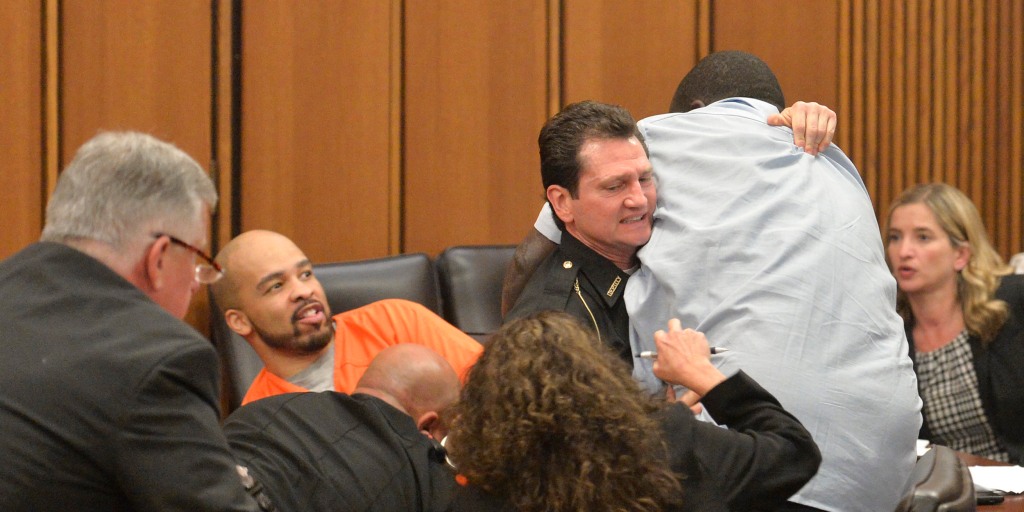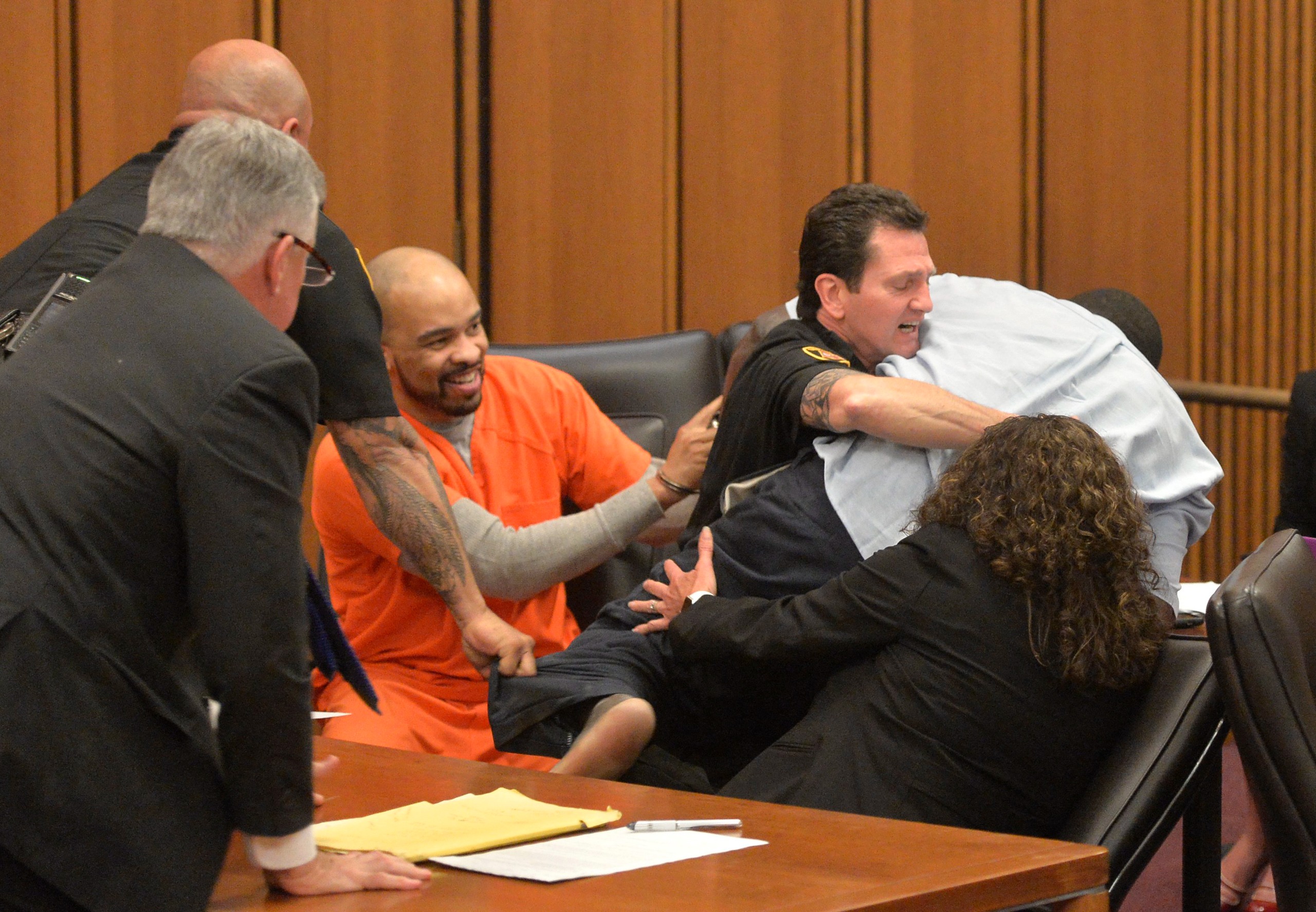CLEVELAND, OHIO — A highly emotional moment unfolded in a Cleveland courtroom when the father of one of the victims of convicted serial killer Michael Madison attempted to confront him physically during a sentencing hearing. The incident occurred shortly after Madison was sentenced to death for the 2013 murders of three women.

Emotional Outburst in Court
Van Terry, the father of 18-year-old Shirellda Terry, who was one of Madison’s victims, attempted to confront the defendant during the sentencing hearing. After delivering a victim impact statement before the court, Terry turned to face Madison and then lunged over the defense table. Courtroom deputies quickly intervened, restraining Terry and restoring order.
Madison, who was seated at the time of the incident, did not appear to suffer any injuries. The disturbance caused a brief disruption, with several people in the courtroom reacting audibly. The session was paused momentarily but resumed about 15 minutes later, according to reports by local media, including Cleveland 19 News.
Judge Nancy McDonnell of the Cuyahoga County Common Pleas Court chose not to clear the courtroom and allowed the hearing to proceed. The sentencing marked the culmination of a lengthy trial process that followed the high-profile 2013 discovery of Madison’s crimes.
Sentencing of Michael Madison
Judge McDonnell accepted the jury’s recommendation and sentenced 38-year-old Michael Madison to death. The jury had previously found him guilty of multiple counts of aggravated murder and kidnapping. Under Ohio law, a jury may recommend the death penalty, but the final decision rests with the judge.
The decision followed deliberations over mitigating factors presented by the defense, including Madison’s troubled childhood and history of abuse. Despite the arguments made by Madison’s attorneys that his upbringing caused long-term psychological damage, the court ultimately ruled that the severity of the crimes outweighed any mitigating evidence.
According to court records, Madison was found guilty of murdering 38-year-old Angela Deskins, 28-year-old Shetisha Sheeley, and 18-year-old Shirellda Terry. Their bodies were discovered in July 2013 in and around the East Cleveland apartment building where Madison lived.
Discovery of the Victims
The investigation began when a cable company employee reported a foul odor emanating from a garage used by Madison. Police discovered the first victim’s body wrapped in plastic and sealed with tape. Subsequent searches led to the discovery of two more bodies — one in the basement of a nearby vacant home and another buried in a backyard.
All three women had been reported missing in the months before their remains were found. According to statements provided to law enforcement, Madison admitted to strangling two of the women but claimed he could not recall the third killing. These admissions were supported by physical evidence presented during the trial.

Background and Legal Proceedings
Michael Madison’s history includes a prior conviction in 2002 for attempted rape, for which he served a four-year prison sentence. As a result, he was registered as a sex offender. Prosecutors used this history, along with the brutality of the 2013 murders, to argue that the death penalty was warranted.
During the mitigation phase of the trial, the defense introduced testimony about Madison’s traumatic upbringing. Reports stated that he experienced significant physical abuse as a child, allegedly at the hands of his mother, stepfather, and other individuals in his household. Mental health experts testified that this history contributed to Madison’s psychological condition, but the jury and the judge were not persuaded that it justified leniency in sentencing.

Broader Context and Public Reaction
The case drew considerable public attention, not only because of the horrific nature of the crimes but also due to parallels drawn to another notorious Cleveland case involving serial killer Anthony Sowell. Sowell was convicted in 2011 of murdering 11 women and was sentenced to death. The discovery of multiple female victims in East Cleveland reignited concerns about the safety of vulnerable women in the area and the need for stronger community protections.
Cuyahoga County prosecutors emphasized that the death sentence in Madison’s case reflects the gravity of the offenses and underscores the justice system’s role in addressing such severe crimes. Assistant County Prosecutor Christopher Schroeder stated that the decision to seek capital punishment was based on both the legal standards and the need to send a message to the community about the consequences of such acts.

Appeals and Execution Status in Ohio
While Madison has been sentenced to death, the actual execution is not expected to take place in the near future. As of the latest reports, the State of Ohio faces significant challenges in carrying out executions due to a shortage of lethal injection drugs. The state has postponed several scheduled executions, and officials continue to evaluate alternative methods and suppliers.
According to the Ohio Department of Rehabilitation and Correction, executions are currently on hold pending further legislative and procedural developments. Even under normal circumstances, death penalty cases involve a series of appeals and legal reviews that can span years or even decades.

Legal and Ethical Considerations
The courtroom incident involving Van Terry highlighted the emotional toll these cases have on the victims’ families. While courtroom security successfully prevented any physical harm, the episode underscored the need for sensitivity, preparation, and support during high-stakes legal proceedings.
Experts in criminal law and trauma response often emphasize the importance of providing mental health resources to family members involved in such trials. The judicial system acknowledges the pain and suffering endured by the victims’ loved ones, but must also maintain decorum and uphold legal standards within the courtroom.
Conclusion
The sentencing of Michael Madison to death for the 2013 murders of three women marks a critical chapter in Cleveland’s recent criminal history. The case illustrates the complexity of the legal process in capital punishment trials, the emotional impact on victims’ families, and the broader societal conversation about justice and accountability.
While the courtroom incident involving Van Terry drew national headlines, the central focus remains on ensuring justice for the victims — Angela Deskins, Shetisha Sheeley, and Shirellda Terry — and reaffirming the legal system’s commitment to handling such tragic cases with dignity and fairness.
Sources:
-
Cuyahoga County Court Records
-
Cleveland 19 News
-
Ohio Department of Rehabilitation and Correction
-
Associated Press
-
Public records regarding the 2013 East Cleveland case and 2002 conviction

